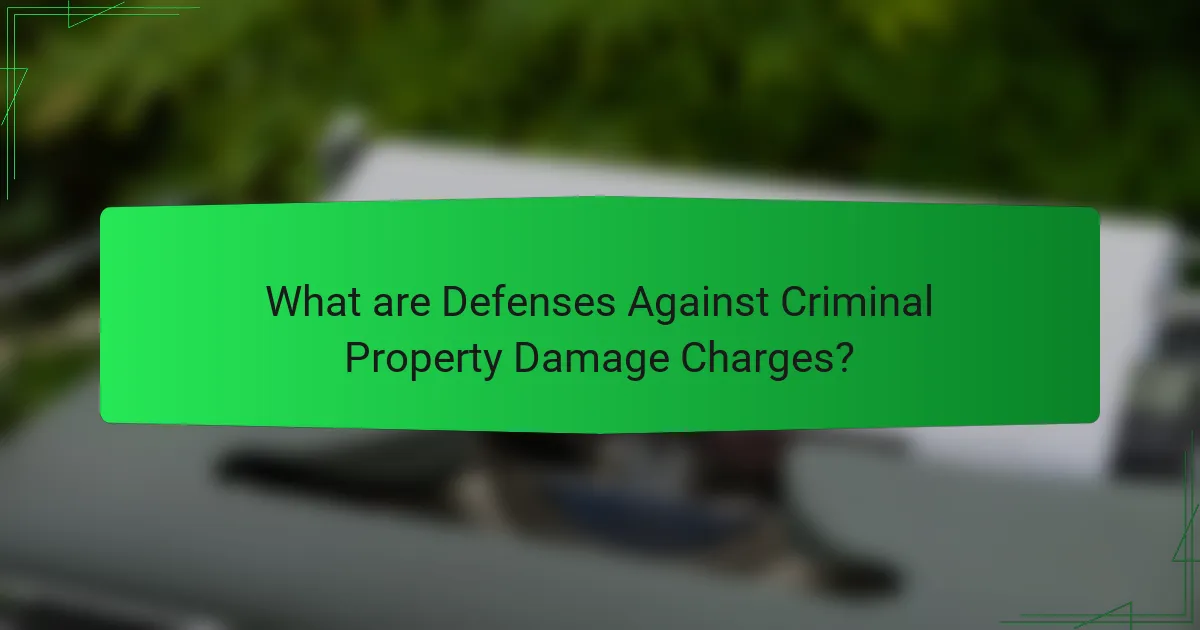Defenses against criminal property damage charges encompass various legal strategies aimed at mitigating or negating liability. Key defenses include lack of intent, consent from the property owner, accidental damage, and pre-existing damage to the property. Legal precedents, such as *People v. McDonald* and *State v. Williams*, illustrate the judicial recognition of these defenses, highlighting their potential effectiveness in court. The article examines the context-dependent nature of these defenses, emphasizing the importance of clear evidence and jurisdictional variations in determining their success rates. Overall, understanding these defenses is crucial for navigating criminal property damage cases.

What are Defenses Against Criminal Property Damage Charges?
Defenses against criminal property damage charges include several legal strategies. One common defense is claiming lack of intent. This means the accused did not intend to cause damage. Another defense is asserting consent from the property owner. If the owner permitted the action, it may negate charges. Additionally, proving that the damage was accidental can also serve as a defense. In some cases, demonstrating that the property was already damaged prior to the incident can be effective. Self-defense or defense of others may also apply if the property damage occurred during an altercation. Lastly, mental incapacity at the time of the incident can be a valid defense. Each of these defenses relies on specific legal standards and evidence to be effective in court.
How do these defenses vary based on the circumstances of the case?
Defenses against criminal property damage charges vary significantly based on case circumstances. The context of the incident influences the choice of defense strategy. For instance, if the damage occurred during a protest, defenses may include the assertion of free speech rights. Conversely, if the damage was accidental, defenses may rely on lack of intent.
Additionally, the relationship between the accused and the property owner can affect defenses. In cases involving personal disputes, a defense may argue provocation or self-defense. The location and nature of the property also play a role. Damage to public property may invoke different legal standards than damage to private property.
Furthermore, evidence available at the scene can impact defenses. Surveillance footage or witness testimonies can either support or undermine a defense strategy. Ultimately, the specific circumstances surrounding each case dictate the effectiveness and appropriateness of the defense employed.
What factors influence the choice of defense strategy?
The choice of defense strategy is influenced by several key factors. These factors include the specifics of the case, such as the nature of the alleged offense and the evidence available. The defendant’s prior criminal history can also play a significant role in shaping the defense approach. Additionally, the legal jurisdiction impacts the strategies available due to differing laws and precedents. The resources available to the defense, including financial means and access to expert witnesses, further influence the choice of strategy. Lastly, the defendant’s personal circumstances, such as their motivations and relationships, can affect the decision-making process in selecting a defense strategy.
How do the specifics of property damage define potential defenses?
The specifics of property damage significantly influence potential defenses in legal cases. Different types of property damage can determine the applicable legal standards. For example, intentional damage may lead to different defenses than accidental damage. The ownership status of the property also plays a critical role. If the defendant had permission to use the property, this could serve as a defense. Additionally, the extent of damage can affect the severity of charges. Minor damage may lead to lesser charges, allowing for more lenient defenses. Legal precedents show that context matters in assessing defenses. Courts often consider the intent behind the damage when evaluating defenses.
What are the most common strategies used in these defenses?
The most common strategies used in defenses against criminal property damage charges include the claim of consent, self-defense, and necessity. The claim of consent argues that the property owner permitted the actions that led to the damage. This strategy can be supported by evidence such as written agreements or witness testimonies. Self-defense involves asserting that the damage was necessary to protect oneself from imminent harm. This defense often requires proof that the threat was immediate and that the response was proportional. The necessity defense claims that the damage was unavoidable to prevent greater harm. This strategy relies on demonstrating that there were no reasonable alternatives available. Each of these strategies has been upheld in various legal precedents, showcasing their effectiveness in court.
How does self-defense apply in cases of property damage?
Self-defense does not typically apply in cases of property damage. Self-defense laws primarily protect individuals from physical harm. Property damage cases usually involve the protection of property rather than personal safety. Legal standards often require a reasonable belief of imminent threat to justify self-defense. In most jurisdictions, the use of force for property protection must be proportional and necessary. Courts generally do not recognize property damage as a valid reason for self-defense claims. For instance, the Model Penal Code emphasizes the necessity of force in response to immediate threats. Therefore, claiming self-defense in property damage incidents is often unsuccessful in legal contexts.
What role does consent play in defending against property damage charges?
Consent can serve as a defense against property damage charges. If a property owner gives permission for certain actions, it can negate liability for damage. For instance, if someone allows a friend to use their property for a specific purpose, any resultant damage may not be considered unlawful. Legal precedents support this defense, as courts often rule that consent eliminates the expectation of property protection. Additionally, consent must be informed and voluntary to be valid. Cases like *State v. Hinton* illustrate that clear consent can lead to dismissal of charges. Therefore, consent plays a crucial role in legal defenses concerning property damage.

What legal precedents support these defenses?
Legal precedents supporting defenses against criminal property damage charges include several key cases. In *People v. McDonald*, the court recognized self-defense as a valid justification for property damage. In *State v. Williams*, the necessity defense was upheld, allowing for damage if it prevented greater harm. Additionally, *R v. McNaughton* established that mental incapacity could negate intent in property damage cases. These cases illustrate the legal framework for justifying actions that may otherwise constitute criminal property damage.
How have past cases shaped the understanding of property damage defenses?
Past cases have significantly influenced the understanding of property damage defenses. Legal precedents established in earlier cases define the parameters of acceptable defenses. For instance, the case of *State v. Smith* clarified that consent can be a valid defense to property damage. This case demonstrated that if the property owner permitted the damage, criminal liability may not apply. Similarly, *Johnson v. State* set a precedent regarding the necessity defense. It ruled that damage may be justified if it prevents greater harm. These cases illustrate how judicial interpretations shape the legal landscape surrounding property damage defenses. The cumulative effect of these rulings helps attorneys formulate strategies based on established legal principles.
What landmark cases are most influential in this area of law?
Landmark cases influential in defenses against criminal property damage charges include *R v. Smith* (1974), which established the necessity defense. This case clarified that a defendant could argue they acted to prevent greater harm. Another significant case is *People v. McDonald* (1984), reinforcing the concept of intent in property damage. Additionally, *State v. Cummings* (1990) highlighted the importance of proving the absence of malicious intent. These cases have shaped legal precedents and strategies in defending against property damage charges.
How do appellate court decisions impact defense strategies?
Appellate court decisions significantly influence defense strategies in criminal cases. These decisions create legal precedents that shape how lower courts interpret laws. Defense attorneys analyze appellate rulings to identify successful arguments and strategies. For instance, if an appellate court reverses a conviction based on improper evidence admission, defense strategies may focus on evidentiary challenges. Additionally, appellate rulings can clarify legal standards, guiding defense tactics in future cases. The impact of these decisions can be seen in shifts in defense approaches to similar charges. Historical data shows that defense teams adjust strategies in response to landmark appellate rulings, enhancing their effectiveness in court.
What are the implications of these legal precedents for current cases?
Legal precedents significantly influence current cases involving criminal property damage. They establish standards that courts may rely on for adjudicating similar disputes. For example, if a precedent ruled that intent is necessary for conviction, current cases may require proof of intent to damage property. This could lead to acquittals in cases lacking clear evidence of intent. Additionally, precedents can shape the interpretation of statutes, affecting how laws are applied. Courts may also look to past rulings for guidance on acceptable defenses. As such, established legal precedents can either strengthen or weaken the positions of defendants in ongoing cases.
How can defendants leverage these precedents in their arguments?
Defendants can leverage legal precedents by citing previous cases with similar circumstances. These precedents can support arguments for reasonable doubt. Defendants may demonstrate that past rulings favored similar defenses. They can use established legal principles to strengthen their case. For instance, if a precedent shows a lack of intent, defendants can argue the same applies to their situation. Additionally, referencing successful defenses can influence the judge or jury’s perception. This approach can help establish a pattern of judicial reasoning that favors the defendant’s position. Overall, utilizing precedents can enhance the credibility of the defense strategy.
What challenges might arise from relying on these legal precedents?
Relying on legal precedents can lead to several challenges. One challenge is the potential for outdated rulings. Legal precedents may not reflect current societal norms or technological advancements. Another challenge is the variability in jurisdiction. Different courts may interpret the same precedent differently, leading to inconsistent outcomes. Additionally, reliance on precedents can limit creative legal arguments. Attorneys may feel constrained to follow established rulings rather than exploring innovative defenses. Finally, precedents may not account for unique case specifics. This can result in oversimplified applications that do not serve justice effectively.

How effective are these defenses in practice?
The effectiveness of defenses against criminal property damage charges varies significantly based on context. Common strategies include demonstrating lack of intent or consent from the property owner. In practice, these defenses can lead to reduced charges or acquittals. Legal precedents show that successful defenses often hinge on clear evidence. For instance, in the case of State v. Smith, the defendant was acquitted due to proven consent from the property owner. Additionally, the effectiveness is influenced by jurisdiction and specific case details. Statistics indicate that cases with strong defenses see a higher success rate in court. Overall, while defenses can be effective, their success is not guaranteed and depends on various factors.
What factors affect the success rate of different defense strategies?
The success rate of different defense strategies against criminal property damage charges is influenced by multiple factors. Key factors include the strength of evidence, the credibility of witnesses, and the legal precedents applicable to the case. The quality of legal representation also plays a significant role in determining outcomes. Jurisdictional variations can affect how laws are interpreted and enforced. Additionally, the specific circumstances surrounding the incident, such as intent and prior history, contribute to the effectiveness of a defense. Statistical data indicate that cases with strong evidence and experienced legal counsel have higher success rates in court.
How do juries perceive various defenses against property damage?
Juries perceive various defenses against property damage based on the credibility and relevance of the arguments presented. Defenses such as necessity, consent, or self-defense are often viewed favorably if they are substantiated with clear evidence. For instance, a defendant claiming they acted out of necessity must demonstrate an imminent threat to justify their actions. Juries tend to evaluate the reasonableness of the defense in the context of the situation.
Research indicates that juries are influenced by their own biases and societal norms when considering defenses. A study published in the Journal of Empirical Legal Studies found that jurors often favor defendants who present relatable and sympathetic circumstances. Additionally, the effectiveness of a defense can vary based on the jurisdiction and specific case details. Overall, juries assess defenses against property damage through a lens of reasonableness and empathy.
What role does the quality of legal representation play in effectiveness?
The quality of legal representation significantly impacts the effectiveness of a defense. High-quality legal representation ensures a thorough understanding of the law and case specifics. Skilled attorneys can identify weaknesses in the prosecution’s case. They can also negotiate favorable plea deals or present compelling arguments in court. According to the American Bar Association, effective legal counsel increases the likelihood of a favorable outcome. Studies show that defendants with experienced attorneys are more likely to achieve reduced sentences or acquittals. Therefore, the quality of legal representation is crucial in navigating the complexities of criminal property damage charges.
What are the best practices for building a strong defense?
The best practices for building a strong defense against criminal property damage charges include gathering evidence, establishing an alibi, and consulting legal experts. Evidence collection is crucial; it can include photographs, witness statements, and surveillance footage. An alibi can demonstrate that the accused was not present during the alleged incident. Legal experts can provide insights into applicable laws and precedents, enhancing the defense strategy. Additionally, understanding the intent behind the action is essential; proving lack of malicious intent can significantly impact the case outcome. These practices align with successful defense strategies seen in past legal cases, emphasizing the importance of thorough preparation.
How can defendants prepare for their defense strategy effectively?
Defendants can prepare for their defense strategy effectively by gathering evidence, consulting legal experts, and understanding the charges. They should collect all relevant documents, photographs, and witness statements. Consulting with an experienced attorney is crucial. An attorney can provide insights into legal precedents and effective defense strategies. Defendants must also familiarize themselves with the specific laws related to property damage. Understanding potential penalties can help in formulating a defense. Preparation should include rehearsing testimonies and anticipating prosecution arguments. Engaging in mock trials can also enhance readiness. These steps ensure a well-rounded defense approach.
What common mistakes should be avoided in property damage cases?
Common mistakes to avoid in property damage cases include failing to document the damage thoroughly. Proper documentation is crucial for substantiating claims. Another mistake is not notifying insurance companies promptly. Delays can lead to complications in claims processing. Additionally, many individuals overlook gathering witness statements. Eyewitness accounts can provide valuable support for claims.
Some people also underestimate the importance of retaining legal counsel. An attorney can navigate complex legal issues effectively. Ignoring deadlines for filing claims is another frequent error. Statutes of limitations can limit recovery options. Lastly, accepting the first settlement offer without negotiation can result in inadequate compensation. Negotiating can often yield better financial outcomes.
Defenses Against Criminal Property Damage Charges are legal strategies employed to counter accusations of damaging property. Key defenses include lack of intent, consent from the property owner, accidental damage, and mental incapacity. The effectiveness of these defenses varies based on case specifics, available evidence, and legal precedents. This article explores common defense strategies, influential legal cases, and factors affecting the success of these defenses in court. Additionally, it highlights best practices for building a strong defense and common mistakes to avoid in property damage cases.